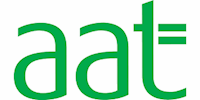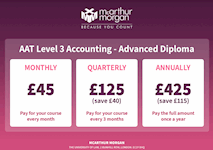AAT Level 3 Advanced Diploma in Accounting - Subscription starts from £45
Online based course with 7 days a week tutor support until 10pm *Hard Copy materials available on request*
McarthurMorgan
Summary
£45 per month
£125 per quarter (save £40) - Pay for your course every 3 months,...
- Tutor is available to students
- TOTUM card available but not included in price What's this?
Add to basket or enquire
Overview
Obtain an outstanding professional accountancy qualification to gain employment or promotion within the finance and accounting industry.
Why study AAT Online Distance Learning - 'On Demand' with McArthur Morgan?
- Maximum Flexibility - Study at your own pace, anytime, anywhere on any device
- We are a dedicated AAT Training provider - this makes us specialists at delivering the AAT qualification.
- We will send the Full range of study materials delivered to your home or office - delivery costs are included.
- Pre-recorded video tutorials, available for every module - delivered by our team of highly experienced, fully qualified accountancy tutors.
- Full tutor support available up to 10pm, 7 days a week.
- We regularly achieve 100% pass rates
The Advanced Diploma in Accounting can lead to employment as:
- Accounts Assistant
- Accounts Payable and Expenses Supervisor
- Accounts Payable Clerk
- Assistant Accountant
- Audit Trainee
- Bookkeeper
- Credit Controller
- Finance Assistant
- Payroll Administrator
- Payroll Supervisor
- Practice Bookkeeper
- Tax Assistant
Qualification
AAT Advanced Diploma in Accounting - Level 3
Course media
Description
The units of this level are:
- Advanced Bookkeeping
- Final Accounts Preparation
- Management Accounting: Costing
- Indirect Tax
- Ethics for Accountants
- Spreadsheets for Accounting
- Advanced Diploma Synoptic Assessment
Modules
Advanced Bookkeeping
- This unit is the first of two Advanced level financial accounting units.
- The purpose of this unit is to build on skills and knowledge learned in the Foundation level accounting units and to develop bookkeeping skills, taken to an initial trial balance.
- Students will study non-current asset accounting in some depth, including the accurate recording and control of the valuable resource of non-current assets which is vital to all organisations
Learning Outcomes
- Apply the principles of advanced double-entry bookkeeping
- Implement procedures for the acquisition and disposal of non-current assets
- Prepare and record depreciation calculations
- Record period end adjustments
- Produce and extend the trial balance
Final Accounts Preparation
- This Advanced level unit is about preparing final accounts for sole traders and partnerships, and helping students to become aware of alternative business organisation structures.
- This purpose of this unit is to provide the background knowledge and skills that a student needs in order to be capable of drafting accounts for sole traders and partnerships.
- Students will recognise special accounting requirements for partnerships.
Learning Outcomes
- Distinguish between the financial recording and reporting requirements of different types of organisation.
- Explain the need for final accounts and the accounting and ethical principles underlying their preparation.
- Prepare accounting records from incomplete information
- Produce accounts for sole traders
- Produce accounts for partnerships
- Recognise the key differences between preparing accounts for a limited company and a sole trader
Management Accounting: Costing
- Management Accounting: Costing provides students with the knowledge and skills needed to understand the role of cost and management accounting in an organisation.
- On successful completion of this unit, students should be able to carry out costing procedures in an organisation’s accounting department with minimal supervision.
- Students will develop a deeper understanding of the fundamental principles that underpin management accounting methodology and techniques
Learning Outcomes
- Understand the purpose and use of management accounting within an organisation.
- Apply techniques required for dealing with costs
- Apportion costs according to organisational requirements
- Analyse and review deviations from budget and report these to management
- Apply management accounting techniques to support decision making
Indirect Tax
- This Advanced level unit is about indirect tax.
- This unit provides students with the knowledge and skills that they need to keep their employers and clients compliant with the laws and practices that apply to the indirect taxation of sales and purchases.
- Students will learn about VAT legislation and the importance of maintaining their technical knowledge through monitoring updates.
Learning Outcomes
- Understand and apply VAT legislation requirements
- Accurately complete VAT returns and submit them in a timely manner
- Understand the implications for the business of errors, omissions and late filing and payment
- Report VAT-related information within the organisation in accordance with regulatory and organisational requirement
Ethics for Accountants
- This unit is about professional ethics in an accounting environment.
- Students will learn the core aspects of the ethical code for accountants as it relates to their work as accounting technicians and as exemplified in the AAT Code of Professional Ethics.
- They will also understand that acting ethically derives from core personal and organisational values, such as honesty, transparency and fairness, as well as from professional ethics.
Learning Outcomes
- Understand the need to act ethically
- Understand the relevance to the accountant’s work of the ethical code for professional accountants
- Recognise how to act ethically in an accounting role
- Identify action to take in relation to unethical behaviour or illegal acts
Spreadsheets for Accounting
- This Advanced level unit is about using spreadsheets to accurately enter, analyse and present information so that informed accountancy judgements can be made.
- Accounting technicians need to use spreadsheets as it is important that financial information is accurately analysed and presented in an unambiguous way.
Learning Outcomes
- Design and structure appropriate spreadsheets to meet customer needs
- Use spreadsheet software to record, format and organise data
- Use relevant tools to manipulate and analyse data
- Use software tools to verify accuracy and protect data
- Use tools and techniques to prepare and report accounting information
Advanced Diploma Synoptic Assessment
- The synoptic assessment will ask students to apply knowledge and skills gained across the qualification in an integrated way, within a workplace context. Scenarios will change over time to ensure the validity of the assessment.
Who is this course for?
- This course is aimed at anybody wanting an accounting qualification or aspiring to become an accountant.
- The AAT qualification is designed to give you a solid base of accounting principles and skills to build on throughout your career.
- The qualification is right up-to-date and a great way to stand out in your company or the job market.
- You may see it as a way of entering the world of accountancy and finance, in the whole range of professions from bookkeeper to financial or management accountant or auditor.
- You may want to learn more about the theories underpinning your current job role.
- You may see it as an invaluable aid to career progression.
- You may have many years’ financial experience and now want a formal qualification.
Requirements
Students who already have double entry knowledge or have completed Level 2.
Career path
The Advanced Diploma in Accounting can lead to employment as:
- Accounts Assistant
- Accounts Payable and Expenses Supervisor
- Accounts Payable Clerk
- Assistant Accountant
- Audit Trainee
- Bookkeeper
- Credit Controller
- Finance Assistant
- Payroll Administrator
- Payroll Supervisor
- Practice Bookkeeper
- Tax Assistant
Questions and answers
Reviews
Currently there are no reviews for this course. Be the first to leave a review.
Legal information
This course is advertised on reed.co.uk by the Course Provider, whose terms and conditions apply. Purchases are made directly from the Course Provider, and as such, content and materials are supplied by the Course Provider directly. Reed is acting as agent and not reseller in relation to this course. Reed's only responsibility is to facilitate your payment for the course. It is your responsibility to review and agree to the Course Provider's terms and conditions and satisfy yourself as to the suitability of the course you intend to purchase. Reed will not have any responsibility for the content of the course and/or associated materials.



